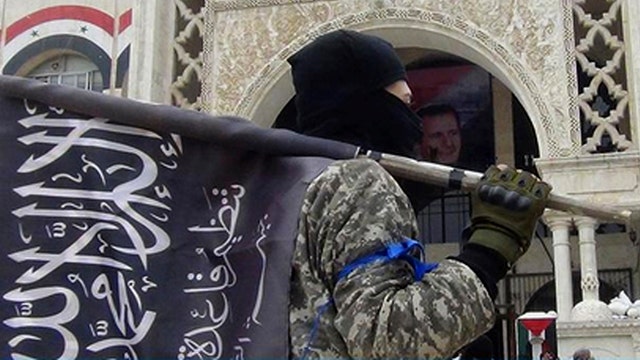Will Syria's moderate opposition work with extremists?
Steven Bucci and James Robbins on concerns over a growing security threat
The United Nations is making a new push for peace in Syria. The intergovernmental organization's Syria envoy, Staffan de Mistura, is inviting leaders of that country's moderate opposition to Geneva to discuss a potential peace plan with Syrian President Bashar Assad.
These new talks, however, are a non-starter, experts tell FoxNews.com. Terror groups like Al Qaeda and ISIS still hold significant territory in the country.
Fox News National Security Analyst KT McFarland spoke with Steven Bucci and James Robbins about the situation in Syria.
More than 40 groups, including some armed opposition groups, are attending the Geneva talks, though critics point out they only represent a fraction of the current political situation in Syria.
“There's a whole bunch of other actors … the so-called radical part of the resistance is the biggest, most powerful, most effective force on the battlefield … these talks are nice, but I don’t think they are going to be terribly effective,” said Bucci, former Deputy Assistant Secretary of Defense during George W. Bush’s administration.
The UN is angling this go-around to have more face-to-face meetings between the different sides, while ambassadors and experts hold closed-door consultations.
Their last meeting in January ended without any agreement. In June 2012, all parties agreed to a framework agreement, but the deal was never implemented.
“The UN is even downgrading expectations. They say they are not negotiations, more like consultations … so you really have to wonder, why are they doing this,” said Robbins, a senior fellow with the think-tank American Foreign Policy Council.
Nusra Front, a group allied with Al Qaeda, mainly has their base of power in Syria’s northwest. ISIS in Syria holds onto control over most of Syria's northeast region.
Bucci points out that “Assad only controls a smart part of the country now – they are leaving major players out, but they are people not terribly amenable to talking with anybody. They just want to win out the barrel of a weapon and that’s the model they are using and it's working pretty well for them.”
While there are growing concerns moderate opposition groups could work with extremist groups, for now experts don’t see that as a likely scenario.
Both remain pessimistic that any substantial change will happen in Syria.
“In six months I think we are where we are right now – the battle goes back and forth … these talks aren’t going to amount to anything and I think we’ll keep seeing the same old thing,” said Robbins.
Bucci agrees. “I don’t see a big change coming; there could be some shifting … not a lot of progress in the next six months.”









































